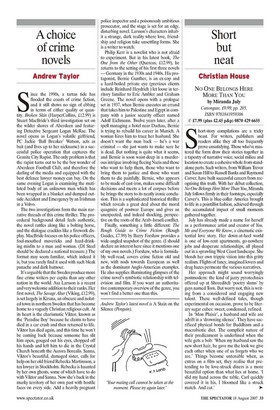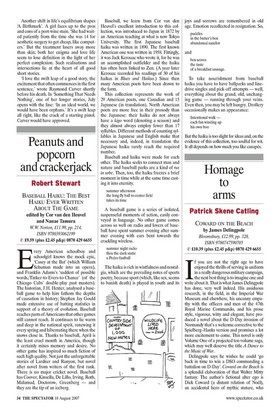Short but neat
Christian House No ONE BELONGS HERE MORE THAN YOU by Miranda July Canongate, £9.99, pp. 205, ISBN 9781841959306 © £7.99 (plus £2.45 p&p) 0870 429 6655 Short-story compilations are a tricky beast. For writers, publishers and readers alike they all too frequently prove unsatisfying. Those who've mastered the form draw their stories together in a tapestry of narrative voice, social milieu and location to create a cohesive whole from standalone parts. Such writers, from William Trevor and Susan Hill to Russell Banks and Raymond Carver, have built successful careers from recognising this truth. With her debut collection, No One Belongs Here More Than You, Miranda July follows firmly in their footsteps, especially Carver's. This is blue-collar America brought to life in a pointillist fashion, achieved through the accumulated impact of small moments gathered together.
July has already made a name for herself as a performance artist and creator of You, Me and Everyone We Know, a cinematic existential love story. Her down-at-heel world is one of low-rent apartments, go-nowhere jobs and desperate relationships, all played out in a sprawling West Coast landscape. She blends her own trippie vision into this gritty realism. Flights of fancy, imagined lovers and drug hazes permeate the various narratives.
Her approach might sound worryingly postmodern: the kind of jazzy pyrotechnics offered up at Shoreditch 'poetry slams' by guys named Torn. But worry not, this is writing from a considered and engaging new talent. These well-defined tales, though experimental on occasion, prove to be literary sugar cubes: sweet, condensed, refined.
In 'Mon Plaisir', a husband and wife are adrift in a 'drowning silence'. They have sacrificed physical bonds for Buddhism and a macrobiotic diet. The complicit nature of their predicament is underlined when the wife gets a bob: 'When my husband saw the new short hair, he gave me the look we give each other when one of us forgets who we are.' Things become untenable when, as extras on a film set, they realise that pretending to be love-struck diners is a more beautiful option than what lies at home. 'I slid my hand across the table, Carl quickly covered it in his, I bloomed like a struck match. And cut.'
Another shift in life's equilibrium shapes 'A Birthmark'. A girl faces up to the pros and cons of a port-wine stain. 'She had waited patiently from the time she was 14 for aesthetic surgery to get cheap, like computers.' But the treatment lasers away more than skin; both her enigma and love life seem to lose definition in the light of her perfect complexion. Such realisations and intersections lie at the heart of all good short stories.
'I love the swift leap of a good story, the excitement that often commences in the first sentence,' wrote Raymond Carver shortly before his death. In 'Something That Needs Nothing', one of her longer stories, July opens with the line: 'In an ideal world, we would have been orphans.' It's a swift leap all right, like the crack of a starting pistol. Carver would have approved.













































 Previous page
Previous page